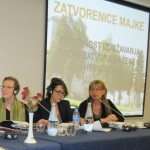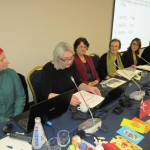COPE played a crucial role in Croatia this week, at a conference marking the close of the two-year EU-funded MA#ME project, piloted and implemented by the NGO RODA for imprisoned mothers separated from their children at Pozega Prison. One of the findings of the project was that 50 to 60 % of children in Croatia do not visit their mothers in prison regularly; some living over 200 kilometres away. The project was instrumental in bringing these children into contact with their parents. RODA’s outreach on a national level in implementing the MA#ME project was impressive, reaching a variety of sectors—occupational, health, social welfare, probation services, and prison services, with training for prison staff on prisoners’ children’s issues a main activity.
Given the recent elections and uncertainty about the new government’s commitment to human rights and child rights in Croatia, it was key to have the COPE network presenting at the final conference within this uncertain context—to underscore the importance of the issue, to emphasise the rights of prisoners’ children, to provide an EU perspective, to highlight the measures and initiatives supporting children of prisoners at EU level, to flag up potential funding streams to ensure the sustainability of the project. COPE Director Liz Ayre presented these and other aspects; Kate Philbrick OBE, fomer COPE president, presented on support initiatives for children of imprisoned parents in Scotland; COPE member Maja Gabelica, Deputy Children’s Ombudswoman in Croatia, spoke about children’s needs.
The media reported widely on the conference, highlighting COPE’s presence. In short, the event has cast a good spotlight on the issue of the rights and needs of prisoners’ children during this critical period in Croatia and the COPE network played an invaluable role in helping generate momentum and providing perspectives for RODA as they look to the future and sustainability. The event was also a great primer for the upcoming COPE conference in Zagreb in May.




